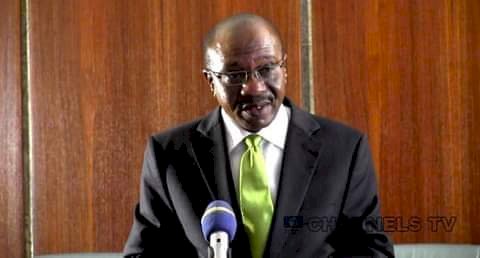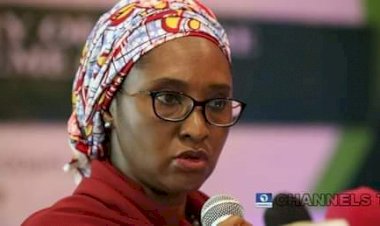Nigeria’s Economy May Emerge From Recession In 2021 Q1, Says Emefiele

The Central Bank of Nigeria (CBN) has predicted that the nation’s economy may emerge from recession in the first quarter of 2021.
CBN Governor, Godwin Emefiele, who made the prediction on Friday during the 55th annual Bankers Dinner which held in Lagos, noted that the expected economic growth was two per cent.
“With the sustained implementation of our intervention measures, we do expect that the Nigerian economy could emerge from the recession by the first quarter of 2021,” he said.
“We also expect that growth in 2021 would attain 2.0 per cent. However, downside risks remain, as restoration of full economic activities, particularly in service-related sectors, remains uncertain until a COVID vaccine is produced and made available to millions of people across the world.
“Second, with the significant rise in cases in advanced markets and the imposition of lockdowns in parts of Europe, concerns remain on the impact this could have on growth in advanced economies, commodity prices and the financial markets.”
The CBN governor also called for measures to “insulate our economy from the impact of these shocks through our diversification efforts, while also working to ensure that we adhere to safety protocols in order to prevent a surge in COVID-19 related cases, as this could further cripple economic activities.
“Our actions in 2021 would be guided by the considerations that emerged from the Monetary Policy Committee meeting of November 23 & 24, 2020, which sought to address the major headwinds exerting downward pressure on output growth and upward pressure on domestic prices.”
Emefiele’s remarks come six days after Nigeria’s economy slipped into another recession, the second of its kind in a space of four years.
According to a new report released by the Nigeria Bureau of Statistics on November 21, the economy shrank again in the third quarter of this year.
The nation’s economy maintained a second consecutive negative growth after contracting by 3.62 per cent in the third quarter.
The cumulative Gross Domestic Product (GDP) for the first nine months of 2020, therefore, stood at -2.48 per cent just as it recorded a -6.10 per cent in the second quarter.
SEE FULL STATEMENT HERE:
Gov. Godwin Emefiele, CON
Address at the 55th Annual Bankers Dinner
Lagos, Nigeria
27 November 2020
_______________________________
(Protocols)
It is indeed a pleasure to once again address the banking community at the 55th Annual Bankers Dinner, being organized by the Chartered Institute of Bankers of Nigeria (CIBN). Since I assumed office as the Governor of the Central Bank of Nigeria in June 2014, I have attended 6 consecutive annual dinners by the CIBN. These dinners provide a significant opportunity for me to engage with stakeholders in the banking and finance community on events that are shaping our economy, and the policy measures being embarked upon by the Central Bank of Nigeria to support greater economic growth and continued stability of our financial system.
Let me at this juncture, specially thank the leadership of the Chartered Institute of Bankers of Nigeria led by its President, Mr. Bayo Olugbemi. I appreciate Mr. Seye Awojobi and his team, for their efforts in putting this event together. I want to also extend my gratitude to the Managing Directors/Chief Executive Officers of our banks and other financial institutions who have found time to attend the conference despite their very busy schedules.
Likewise, I welcome my colleagues from the CBN, especially the Deputy Governors, and other senior management of the Bank who are present. And to everyone at this event whether in person or virtually, I would like to thank you for attending.
This dinner comes at a challenging time for our nation, taking into account the impact of COVID-19 on the global economy. In Nigeria, we had to address the public health challenge, in addition to implementing a variety of policy measures aimed at reversing the unprecedented downturn in economic activities during the first half of the year. The emerging reports on progress in developing a vaccine by several firms is indeed reassuring, as it indicates that a solution to the health challenge is in sight. It will also help to support growth in the medium term, by aiding full restoration of economic activities particularly in service related sectors such as education, aviation, hospitality and tourism.
In my remarks today, I hope to provide an assessment of the measures taken by the Central Bank of Nigeria in addressing the impact of the COVID-19 pandemic on the Nigerian economy, as well as our outlook on the path ahead.
Pre-COVID-19 Economy
As we are all aware, prior to the onset of the virus in December 2019, the Nigerian economy was on a positive growth trajectory, having made a significant recovery from the 2016-2017 recession, which was triggered by the drop-in commodity prices in 2016. Following the recession, we witnessed 12 consecutive quarters of economic expansion, and GDP growth in the fourth quarter of 2019 stood at 2.55 percent. Our exchange rate remained stable for over two years at N360/$ and our external reserve witnessed significant accretions from the sale of crude oil and continued inflows from foreign investors.
Our banking system remained strong, as key indicators reflected improvements across several areas. Capital adequacy ratio for the banking industry was above 15 percent, surpassing the prudential requirement. The ratio of non-performing loans declined from 11 percent in April 2019 to less than 6.1 percent by January 2020. Our intervention efforts in the agriculture and manufacturing sectors continued to support employment generating activities and improved local production of goods that can be produced in Nigeria.
COVID 19
The onset of the COVID-19 pandemic in the first half of 2020, and the lockdown measures put in place to contain the spread of the virus, caused an unprecedented shock to the global economy. Global economic downturn, which was particularly significant in the second quarter of the year, saw declines in growth in advanced and emerging market countries, such as the United States (-9.5 percent), United Kingdom (-20 percent), India (-24 percent) and South Africa (-17 percent). As a result, far-reaching measures were taken by fiscal and monetary authorities in advanced and emerging markets to stabilize their respective economies.
Like other economies, the Nigerian economy was not immune from the COVID-19 shock in 2020. Nigeria’s gross domestic product (GDP) contracted by -3.4 percent in the third quarter, a welcome improvement from the – 6.1 percent recorded in the second quarter.
The negative rate of growth was due to a series of external factors in addition to the lockdown measures, imposed in order to curtail the spread of the virus. Some of the key constricting factors were: Crude Oil Restriction on global travel by land and air; along with the slowdown in commercial activities, led to a significant reduction in the demand for crude oil, which contributed to a 65 percent decline in crude oil prices between January and May 2020. The drop in crude prices, along with OPEC reduction of Nigeria’s production quota led to a significant decline in our foreign exchange earnings, along with a more than 60 percent decline in revenues due to the federation account.
Today, crude oil prices have recovered from its low of US$19 per barrel in April 2020 to US$45 per barrel in November 2020; but it is yet to return to pre-pandemic levels of over US$60 per barrel as at January 2020. GDP growth in the oil sector in the third quarter remained subdued due to the OPEC restrictions on oil output.
Restrictions on Movement GDP growth particularly in the manufacturing sector was significantly impacted by the restrictions on movement as many factories and businesses operated at limited capacity, in addition to a decline in demand for service-related activities, which require extensive in person contact, such as transportation, hospitality and tourism.
Global Supply Chains
Significant disruptions in domestic and global supply chains as a result of lockdown measures in key markets in Asia and Europe between March and May 2020, affected delivery of inputs and machinery to firms in Nigeria and this contributed to a slowdown in manufacturing activities. Some countries such as India and Vietnam imposed restrictions on the exports of vital materials in order to meet the needs of their local market. This challenge reinforces the need to build more resilient systems that can support our production needs in times of crisis.
Capital Flows
The impact of the pandemic and the resulting slowdown in economic activity, led to a significant outflow of funds from emerging market economies. Foreign investors withdrew over $100bn worth of funds from emerging markets between February and April 2020. These funds were subsequently invested in safe haven assets such as US treasury bills and the Japanese Yen. The increase in outflows from emerging markets also led to a corresponding depreciation in the currencies of several emerging market countries such as Brazil (- 27.3%), Turkey(-35.1%), Argentina(-35%), Russia(-20%), Angola(-27%) and South Africa(-9%) year to date.
Exchange Rate
Like other emerging market countries andcountries reliant on oil exports, the decline in crude oil earnings as well as the retreat by foreign portfolio investors significantly affected the supply of foreign exchange into Nigeria. In order to adjust for the decrease in supply of foreign exchange, the naira depreciated from N305/$ to N360/$ and subsequently to N380/$. With the decline in our foreign exchange earnings and successive exchange rate adjustments, the CBN has continued to implement a demand management framework, which is designed to bolster the production of items that can be produced in Nigeria, and aid conservation of our external reserves.
Due to the unprecedented nature of the shock, we continued to favour a gradual liberalization of the foreign exchange market in order to smoothen exchange rate volatility and mitigate the impact which, rapid changes in the exchange rate could have on key macro-economic variables. This we believe is in line with international best practices in countries where managed float arrangements are in operation. At the same time, measures are being taken by the authorities to improve our non-oil exports and other sources of foreign exchange.
These measures have helped to prevent a significant decline in our reserves. Our external reserves currently stand above $35 billion and are sufficient to cover 7 months of import of goods and services. Inflation Inflationary pressure persisted during the year due to several factors. In addition to the disruption to global and domestic supply chains as a result of COVID-19, inflation was exacerbated by the increase in VAT rate, petroleum prices, electricity price adjustments, farmer-herder clashes, exchange rate adjustment, and flooding that occurred in many parts of our farm belt areas. Inflation in October 2020 stood at 14.2 percent. We however expect inflation to begin to moderate by the first half of 2021 as efforts are being made to enable significant cultivation and production of key staple items in the dry season.
Response by the Monetary and Fiscal Authorities
Given the impact on COVID-19 on key economic variables earlier mentioned, the fiscal and monetary authorities took unprecedented measures to prevent any long-term damage to the growth prospects of our economy. Our first objective was to restore stability to the economy by providing assistance to households and businesses that had been severely affected by the pandemic. In addition, we sought to stimulate economy activity through targeted interventions in critical sectors such as agriculture, manufacturing, electricity and construction. Cumulatively our intervention efforts represent about 3.5 percent of Nigeria’s GDP. Some of these measures we took include:
A cumulative reduction of the monetary policy rate from 13.5 to 11.5 percent between May and September 2020 in order to spur lending to the economy.
A 1-year extension of the moratorium on principal repayments for CBN intervention facilities;
iii. Regulatory Forbearance was granted to banks to restructure loans given to sectors that were severely affected by the pandemic
Reduction of the interest rate on CBN intervention loans from 9 to 5 percent
Strengthening of the Loan to Deposit ratio policy, which has resulted in a significant rise in loans provided by financial institutions to banking customers. Total gross credit rose by over 21 percent over the past year, from N15.5 trillion to N19.54 trillion. In addition, over N738 billion has been provided as credit to manufacturing related activities by the banks.
Creation of N150 billion Targeted Credit Facility (TCF) for affected households and small and medium enterprises through the NIRSAL Microfinance Bank. Already, N149.21 billion has been disbursed to 316,869 beneficiaries. Given the resounding success of this program and its positive impact on output growth, we have decided to double this fund to about N300 billion, so as to accommodate many more beneficiaries and boost consumer expenditure which should positively impact output growth.
vii. The Bank also disbursed AgriBusiness/Small and Medium Enterprise Investment Scheme (AGSMEIS) (N92.90 billion to 24,702 beneficiaries), Anchor Borrowers Program (ABP) by the sum of N164.91 billion to 954,279 beneficiaries.
viii. Mobilization of key stakeholders in the Nigerian economy through the Coalition against COVID19(CACOVID), which led to the provision of over N28bn in relief materials to affected households, and the set-up of 39 isolation centers across the country.
Creation of a NGN100 billion intervention fund in loans to pharmaceutical companies and healthcare practitioners intending to expand and strengthen the capacity of our healthcare institutions; so far 60 health care related projects are being funded to the tune of over N60 billion as a result of the intervention.
Creation of a research fund, which is designed to support the development of vaccines in Nigeria.
Establishment of a N1 trillion facility in loans to boost local manufacturing and production across critical sectors; 53 major manufacturing projects, 21 agriculture related projects and 13 service projects are being funded to the tune of over N360 billion from this facility.
Results of our interventions
The impact of these measures along with the removal of restrictions on movement and resumption of international travel, led to improvement in key indicators of the economy, as several economic activities returned to positive growth.
A sectoral assessment of economic activities in the third quarter indicates that the economy witnessed positive growth in key sectors such as Information and Communications Technology, Agriculture, Health, Construction, Finance and Insurance and Public Administration. The Agricultural sector continued to record positive growth supported by productivity gains in the sector, interventions by the government, and improved demand for local produce.
The Manufacturing Purchasing Managers Index, in the month of November stood at 50.2 points, indicating an expansion in manufacturing activities after six months of contraction. A total of 18 sectors recorded positive growth in the third quarter relative to 13 sectors in the second quarter, which reflects significant improvement in economic activity.
Furthermore, 36 out of the 46 economic activities tracked by NBS, reflected positive improvements in growth, which includes activities that recorded negative growth.
In the Investors and Exporters Window, close to $150m is being traded daily as a result of our measures to sanitize activities in the foreign exchange market. In addition, the Nigerian Stock Exchange All Share index rose by 65 percent between April and November 2020, reflecting improved sentiments by investors on the fundamentals of publicly listed companies. As a result of these measures, GDP growth in the third quarter, improved to -3.6 percent from -6.1 percent in quarter two, even though the economy fell back into a recession. We however expect that Nigeria would emerge from the recession by the first quarter of 2021, due to high frequency data that indicates continued improvements in the non-oil sector of our economy.
Financial System Stability
With the decline in economic activities, the CBN instituted measures in the banking system, in order to prevent an economic crisis from spilling over into a financial crisis.
Inaction on our part would have led to a wave of bankruptcies by firms along with rising unemployment, which would ultimately have a significant impact on the balance sheet of banks. As a result, we ensured that;
Banks made adequate capital provisions to cover for unexpected losses
We supported viable businesses that had been affected by the pandemic through access to our intervention funds
III. We enabled banks to restructure loans granted to sectors affected by the
pandemic. As a result of these measures, NPL ratios has remained low at 5.7 percent. The capital adequacy ratio of the banking industry, at 15.5 percent, remains above the prudential requirement percent. In addition, return on earnings in the banking sector was over 21 percent as at October 2020. Similarly, Other Financial Institutions (OFIs) recorded a remarkable improvement as aggregate assets grew by N582 billion, or 16.94 per cent (year-on-year), to N4.02 trillion as at end-September 2020.
While the news of the continued growth in the banking and finance sector in the third quarter of the year is encouraging, the ultimate strength of our financial system would depend on three key factors;
Ensuring that banks have adequate capital buffers to withstand similar pandemics.
Developing adequate internal controls that will be able to identify potential risks to banks, such as cyber threats, as well as putting in place measures to contain these risks.
III. Being able to adapt your business model to changes taking place in the business environment.
This last point is vital as COVID-19 has demonstrated the impact externally induced disruptions could have on the Nigerian economy. It is therefore imperative from an economic as well as a security perspective, that the banking and financial system works to support growth in sectors that have significant growth potential, and can enhance the resilience of the Nigerian economy, in the face of external shocks.
Outlook
With sustained implementation of our intervention measures, we do expect that the Nigerian economy could emerge from the recession by the first quarter of 2021. We also expect that growth in 2021 would attain 2.0 percent. However, downside risks remain, as restoration of full economic activities, particularly in service related sectors, remains uncertain until a COVID vaccine is produced and made available to millions of people across the world.
Second, with the significant rise in cases in advanced markets and the imposition of lockdowns in parts of Europe, concerns remain on the impact this could have on growth in advanced economies, commodity prices and the financial markets.
We must therefore find ways to insulate our economy from the impact of these shocks through our diversification efforts, while also working to ensure that we adhere to safety protocols in order to prevent a surge in COVID-19 related cases, as this could further cripple economic activities.
Our actions in 2021 would be guided by the considerations that emerged from the Monetary Policy Committee meeting of November 23 & 24, 2020, which sought to address the major headwinds exerting downward pressure on output growth and upward pressure on domestic prices.
Given the fact that the rise in inflation is not due to monetary factors but rather the prevalence of structural rigidities and supply shocks, traditional tools of monetary policy may not be helpful in addressing current inflationary pressures. Rather, a more useful policy will be the supply-side measures implemented by the Bank. As a result, emphasis will be placed on strengthening the development finance initiatives of the CBN in order to stimulate greater production and reduce unemployment.
We intend to increase our support for measures that will aid improve cultivation of local produce in Nigeria, with particularly emphasis on improving our yield levels, as food inflation continues to remain the key driver of inflationary trends.
The banking sector therefore has a significant role to play as a facilitator of growth in the agriculture sector, through its intermediation function. Some of the opportunities in the agriculture sector that banks should explore include ways to address some of the existing gaps in the agriculture value chains, such as storage centers, transport logistics, and technology platforms, that can enable rural farmers to sell their produce directly to the markets. These measures would help to improve productivity of farmers, reduce post-harvest losses, increase access to finance for farmers and improve sourcing of local raw materials for processing by manufacturing and industrial firms. It will also aid improved production of local goods, enable the creation of jobs, while supporting the growth of other sectors of our economy such as manufacturing, and transportation.
Information Communication Technology
Another sector which has emerged as a significant source of resilience in mitigating the impact of COVID-19 on the economy, has been Information and Communications Technology (ICT). In the third quarter of 2020, the ICT sector made contributions of over 17.8 percent to GDP growth, 47 percent higher than its contributions a year earlier.
The growth of startups in the fintech and health care space rose in response to the pandemic. It is important that we leverage ICT as an enabler for growth in key sectors of the economy.
ICT start-ups are emerging to support SMEs, farmers, and in providing quality learning to students. It is important that the banking sector consider viable IT firms in these areas that have the potential to not only serve the needs of the local market but are also able to export ICT related services to countries across the world. India for example exports close to a $100bn worth of ICT related services every year and I believe that our ICT industry can make significant contributions to our export earnings.
The Central Bank recently issued Payment Service Banks licenses to 3 firms as part of our efforts to drive financial inclusion and ensure that majority of Nigerian citizens are banked. The Payment Service Banks, along with Mobile Money Operators and Banks are expected to leverage ICT channels in improving penetration of digital financial services and products to Nigerians. Driving sustainable growth of our economy would require that the banking industry, support the growth of ICT firms that are inclined to improve productivity across key sectors in the economy.
Infrastructure Finance
Another critical area that the banking sector ought to consider for stable growth of our economy is Infrastructure Finance. With the decline in revenues due to federal and state government as a result of the drop in crude oil prices, alternative ways of funding infrastructure are critical if we are to generate sustained growth of our economy. As we are all aware, the cost of logistics is often seen as a significant impediment to the growth of businesses in the country.
A well-built infrastructure system, comprising hard infrastructure such as roads and ports, and soft infrastructure such as broadband penetration, can have a multipliereffect on growth by enabling the expansion of business activities in the country. We believe that a well-structured infrastructure fund can act as a catalyst for growth in the medium and the long run. The support of the banking community will be important in achieving this objective.
Conclusion
Distinguished ladies and gentlemen, in concluding my remarks, let me assure all Nigerians that the Monetary and Fiscal authorities are alive to their responsibilities to restore the economy back to recovery.
At this point, I would like to seize this opportunity to appeal to Nigerians, particularly our Media Economic Analysts.
We confess that the problem we face today is of a global dimension. The global economy is challenged, just like the Nigerian economy. My appeal to our media analysts is that in the course of conducting their analysis of the Nigerian economy, they should realize that their public comments particularly if they are alarmist, create panic in our environment. We cherish their counsel but urge that they be more constructive in their pungent criticisms, which could hamper our efforts to return our country and economy back to recovery. When you overdramatize the problem, you create panic that slows the process of recovery.
While COVID-19 has brought on several challenges to our economy and indeed the banking sector, it offers a unique opportunity for us to build a more resilient economy that is better able to contain external shocks, whilst supporting growth and wealth creation in key sectors of our economy. Proactive steps on the part of stakeholders in the banking and financial system in supporting the growth of sectors such as agriculture, ICT and infrastructure, will strengthen our ability to deal with the challenges that have been brought on by COVID-19 while enabling the growth of our economy in general.
I thank you for your attention.
Godwin I. Emefiele (CON)
Governor
Central Bank of Nigeria
27th November 2020


















































